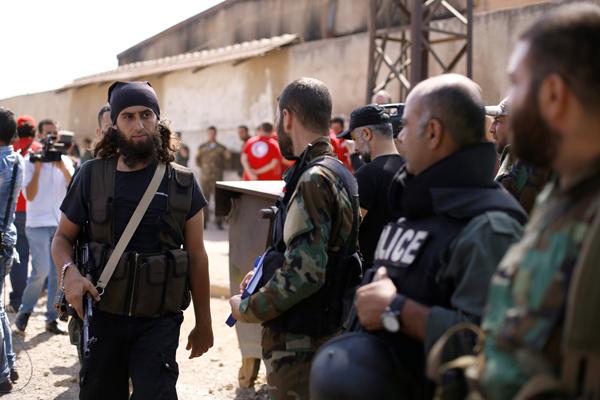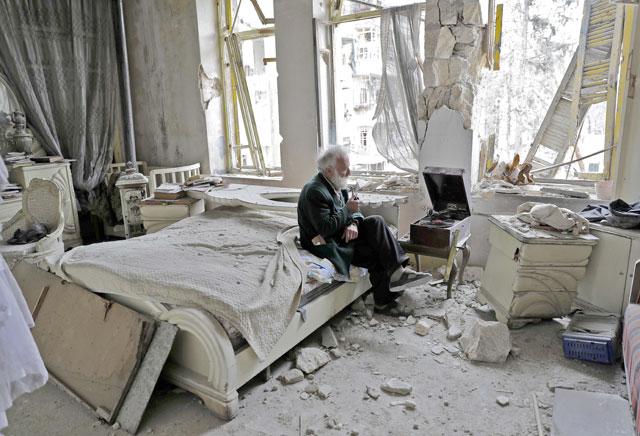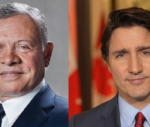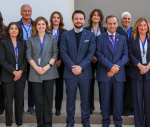You are here
Aleppo hit by worst strikes for months as Putin, Assad ignore US plea
By Reuters - Sep 22,2016 - Last updated at Sep 22,2016

A rebel fighter (left) walks next to Syrian army soldiers prior to evacuating the besieged Waer district in the central Syrian city of Homs, after a local agreement reached between rebels and Syria's army, Syria, Thursday (Reuters photo)
BEIRUT —Warplanes mounted the heaviest air strikes in months against rebel-held districts of the city of Aleppo overnight, as Russia and the Syrian government spurned a US plea to halt flights, burying any hope for the revival of a doomed ceasefire.
Rebel officials and rescue workers said incendiary bombs were among the weapons that rained from the sky on the city. Hamza Khatib, the director of a hospital in the rebel-held east, told Reuters the death toll was 45.
"It's as if the planes are trying to compensate for all the days they didn't drop bombs" during the ceasefire, Ammar Selmo, the head of the civil defence rescue service in opposition-held eastern Aleppo told Reuters.
"It was like there was coordination between the planes and the artillery shelling, because the shells were hitting the same locations that the planes hit," he said.
The assault, by aircraft from the Syrian government, its Russian allies or both, made clear that Moscow and Damascus had rejected a plea by US Secretary of State John Kerry to halt flights so that aid could be delivered and a ceasefire salvaged.
In a tense televised exchange with Russian Foreign Minister Sergei Lavrov at the United Nations on Wednesday, Kerry said stopping the bombardment was the last chance to find a way "out of the carnage".
President Bashar Assad, meanwhile, indicated he saw no quick end to the war, telling AP News it would "drag on" as long as it is part of a global conflict in which terrorists were backed by Saudi Arabia, Qatar, Turkey, and the United States.
Moscow and Washington announced the ceasefire two weeks ago with great fanfare. But the agreement, probably the final bid for a breakthrough on Syria before President Barack Obama leaves office next year, appears to have suffered the same ill fate as all previous peace efforts in a war that has killed hundreds of thousands of Syrians and made half the nation homeless.
The truce foundered on Monday with an attack on an aid convoy, which Washington blamed on Russian warplanes. Russia denied involvement. Prior to that, tensions between Washington and Moscow spiked over a lethal air raid on Syrian government troops by the US-led coalition against the Daesh terror group.
Washington says it struck Syrian forces by mistake on September 17. Assad said in his interview he believed the strikes, which he said lasted over an hour, were deliberate.
There was no immediate comment from the Syrian military or mention on state media of Thursday's bombardment of Aleppo.
"It was the heaviest air strikes for months inside Aleppo city," said Rami Abdulrahman, director of the Syrian Observatory for Human Rights which monitors the conflict from Britain.
A senior official in the Levant Front, an Aleppo-based rebel group, told Reuters: "The Russians only want surrender. They have no other solution."
In another sign of the Syrian government's determination to seize and hold more territory, it pressed on with the evacuation of rebel fighters from the last opposition-held district of Homs, which would complete the government's recapture of the central city, now largely reduced to ruins.
UN resumes aid deliveries
Assad, helped by Russian air power and Iranian-backed militias, has steadily tightened his grip on the opposition-held eastern areas of Aleppo this year, achieving a long-held goal of fully encircling it this summer.
Capturing the rebel-held half of Syria's largest city would be the biggest victory of the war for the government side, which has already achieved its strongest position in years thanks to Russian and Iranian support.
The United Nations announced that it was resuming aid deliveries to rebel-held areas on Thursday following a 48-hour suspension to review security guarantees after Monday's attack on an aid convoy near Aleppo that killed around 20 people.
"We are sending today an inter-agency convoy that will cross conflict lines into a besieged area of rural Damascus," Jens Laerke, spokesman of the UN Office for the Coordination of Humanitarian Affairs, told Reuters.
German Foreign Minister Frank-Walter Steinmeier called for a temporary halt to all military flights: "If the ceasefire is to stand any chance, the only path is a temporary, but complete ban of all military aircraft movement in Syria — for at least three days, better would be seven days," Steinmeier said.
Homs evacuation
But the president of Iran on Wednesday dismissed that idea, saying it would help Daesh and the Nusra Front, Al Qaeda's Syrian branch, which changed its name in July and says it cut its ties to the network founded by Osama Bin Laden.
Assad has appeared as uncompromising as ever in recent weeks, reiterating his goal of taking back the whole country on the day the US-Russian brokered truce took effect.
The government's main focus has been to consolidate its grip over the main cities of western Syria and the coastal region that is the ancestral homeland of Assad's Alawite sect.
On Thursday, around 120 rebel fighters and their families were evacuated from the last opposition-held district of Homs under an agreement with the government by which they were given safe passage to nearby rebel-held areas.
The opposition says such agreements are part of a government strategy to forcibly displace populations from opposition-held areas after years of siege and bombardment.
The Syrian Observatory for Human Rights estimates several thousand rebel fighters remain in the al-Waer district.
The fighters, carrying their personal weapons, and their families will head from the al-Waer neighbourhood to the rebel-held northern Homs countryside, then travel on to rebel-held Idlib province, Homs Governor Talal Barazi said.
Diplomats were due to convene later on Thursday in New York as part of the International Syria Support Group (ISSG). A senior UN official held out hope that the truce could be reestablished.
"Clearly, the resumption of the talks would be greatly helped by revitalising the cessation of hostilities, and I think that is a possibility," UN Deputy Special Envoy for Syria Ramzy Ezzeldin Ramzy told reporters in Geneva.
"That is the objective of the meeting of the ISSG."
Related Articles
BEIRUT — Syrian government jets bombed a rebel-held district of Homs city in the west of the country on Wednesday, killing several people, r
DAMASCUS — Hundreds more Syrian rebels and their families left the last opposition-held neighbourhood of the central city of Homs on Saturda
BEIRUT — Syrian rebel groups called for the postponement of Russian-backed peace talks in Kazakhstan this month and said further meetings wo
















